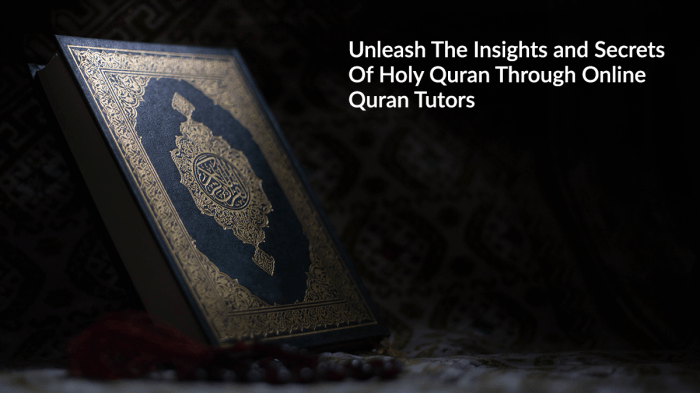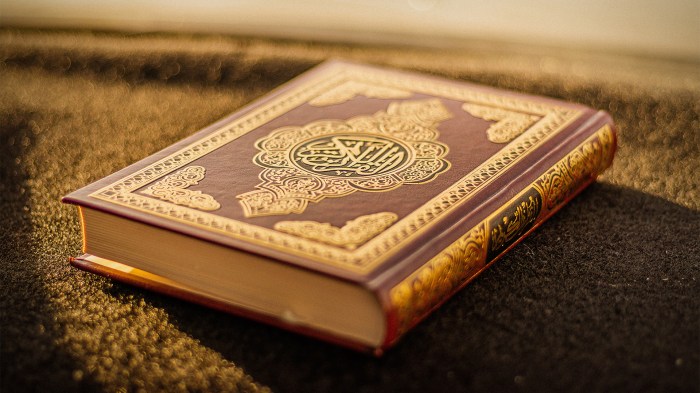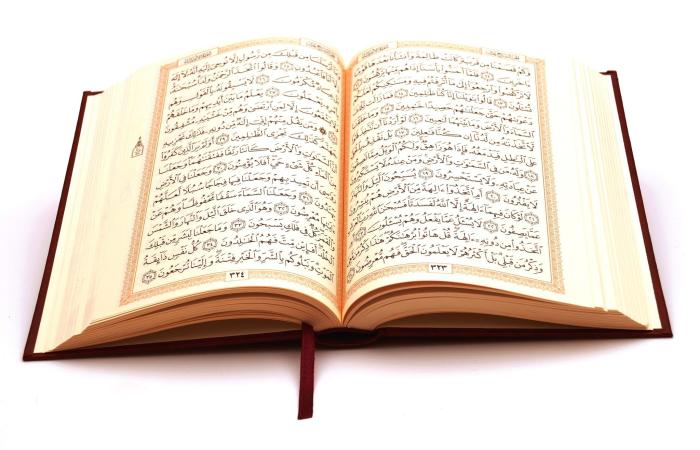The secrets of the quran – The Quran, Islam’s holy book, holds secrets that have captivated the hearts and minds of believers for centuries. Join us on an enthralling journey as we delve into the origins, structure, and profound teachings of this revered text.
From its divine revelation to the Prophet Muhammad (PBUH) to its enduring impact on Muslim societies, the Quran is a tapestry woven with wisdom, guidance, and timeless truths. Prepare to be illuminated as we unravel the secrets that lie within its pages.
The Origins and History of the Quran
The Quran, the central religious text of Islam, is believed to be the verbatim revelation from God to the Prophet Muhammad (PBUH) over a period of 23 years, beginning in 610 CE. According to Islamic tradition, the Quran was revealed to Muhammad through the angel Gabriel, and was initially memorized and recited by the Prophet and his followers.The
Quran was not compiled into a single written text during the lifetime of the Prophet Muhammad (PBUH). Instead, it existed as a collection of memorized verses and fragments. After the Prophet’s death in 632 CE, the task of compiling the Quran into a written form fell to his companions, who gathered and standardized the scattered verses.
The first official compilation of the Quran was undertaken during the reign of the third Caliph, Uthman, around 650 CE. This compilation, known as the Uthmanic Codex, became the standard version of the Quran and has been preserved to this day.
The Structure and Organization of the Quran: The Secrets Of The Quran

The Quran, the holy book of Islam, possesses a unique structure and organization that distinguishes it from other religious texts. It comprises 114 chapters known as surahs, which are further divided into over 6,000 verses called ayahs.
The surahs are arranged in a specific order, starting with the longest and gradually decreasing in length. This arrangement is not chronological or thematic but rather based on the divine revelation received by the Prophet Muhammad (PBUH). Thematic organization is also present within the surahs, with verses related to specific topics grouped together.
The Significance of Al-Fatihah
The first chapter of the Quran, Al-Fatihah (The Opening), holds immense significance. It serves as a concise summary of the Quran’s central themes and is recited in every prayer. Al-Fatihah expresses gratitude to God, acknowledges His sovereignty, and seeks His guidance and protection.
The Literary and Linguistic Aspects of the Quran
The Quran is renowned for its exquisite literary style, characterized by eloquent prose, captivating rhythm, and vivid imagery. Its masterful use of Arabic language has captivated generations of scholars and literary enthusiasts alike.
Eloquence and Rhythm
The Quran’s eloquence stems from its carefully chosen words and phrases, arranged in a manner that creates a harmonious flow. Its verses often employ parallelism, repetition, and rhyme, enhancing their melodic quality and memorability. The Quran’s rhythm is further accentuated by the use of specific metrical patterns, adding to its poetic beauty.
Imagery and Metaphors
The Quran employs a rich tapestry of imagery and metaphors to convey its messages. It draws upon familiar scenes from nature, human experience, and historical events to illustrate complex concepts and evoke powerful emotions. These vivid images not only engage the reader’s imagination but also serve as mnemonic devices, aiding in the retention and understanding of the Quran’s teachings.
Arabic Language and Grammar
The Quran’s use of Arabic language is both sophisticated and accessible. It employs a wide range of vocabulary, from common words to rare and archaic terms. Its grammar is precise and often employs unique constructions that enhance the text’s meaning and impact.
The Quran’s grammar also allows for multiple interpretations, reflecting the multifaceted nature of its message.
Impact on Interpretation
The literary and linguistic qualities of the Quran have a profound impact on its interpretation and understanding. The eloquence and rhythm of the text contribute to its aesthetic appeal and emotional resonance. The imagery and metaphors invite readers to engage with the Quran on a deeper level, while the use of Arabic language and grammar influences the way in which its teachings are understood.
The Central Themes and Beliefs of the Quran
The Quran, the sacred text of Islam, contains a wealth of teachings and beliefs that form the core of the Islamic faith. These teachings revolve around several central themes, including monotheism, prophecy, revelation, and the afterlife.
Monotheism (Tawhid)
One of the most fundamental principles of the Quran is the concept of tawhid, or the oneness of God. The Quran emphasizes that there is only one God, Allah, and that all other beings are subordinate to Him. Tawhid is considered the foundation of Islamic belief and is reflected in the Quran’s teachings on worship, prayer, and the purpose of life.
Prophecy
The Quran recognizes a long line of prophets sent by God to guide humanity. These prophets include Adam, Noah, Abraham, Moses, Jesus, and Muhammad (peace be upon them all). The Quran teaches that Muhammad is the final prophet and that his teachings complete the divine message.
Revelation
The Quran is believed by Muslims to be the direct revelation of God’s word to Muhammad. It is seen as the culmination of previous revelations and contains the final and complete guidance for humanity. The Quran’s teachings cover a wide range of topics, including law, ethics, history, and spirituality.
The Afterlife
The Quran emphasizes the importance of the afterlife and teaches that all people will be held accountable for their actions in this world. The Quran describes heaven as a place of eternal bliss and hell as a place of punishment.
The Quran’s teachings on the afterlife have a profound impact on Muslim beliefs and practices.
The Interpretation and Understanding of the Quran

The Quran, as the central religious text of Islam, has been the subject of numerous interpretations and understandings throughout history. Different approaches have emerged, each seeking to unravel the complexities and nuances of the sacred text.
Literalism
Literalism, as an approach to Quranic interpretation, focuses on the literal meaning of the text. Proponents of this approach argue that the Quran’s words should be taken at face value, without resorting to allegorical or symbolic interpretations.
Symbolism
In contrast, symbolism interprets the Quranic text as a collection of symbols and metaphors. This approach views the Quran as a literary masterpiece, where deeper meanings are hidden beneath the surface. Symbolism allows for a more flexible understanding of the text, enabling interpretations that go beyond the literal sense.
Contextualism
Contextualism, as an interpretive approach, emphasizes the importance of considering the historical, social, and cultural context in which the Quran was revealed. Proponents of contextualism argue that the meaning of the Quran cannot be fully understood without considering the circumstances surrounding its revelation.
The Role of Scholars and Exegetes
Throughout history, scholars and exegetes have played a crucial role in interpreting the Quran and providing guidance to Muslims. These scholars, known as mufassirs, have dedicated their lives to studying the Quran and developing comprehensive commentaries that explain the text’s meaning and significance.
Challenges and Controversies
The interpretation of the Quran has not been without its challenges and controversies. Different interpretations have often led to debates and disagreements among scholars and Muslims. These controversies have ranged from issues of jurisprudence to matters of faith and belief.
The Impact of the Quran on Muslim Societies

The Quran has profoundly impacted Muslim societies throughout history, shaping their laws, ethics, culture, education, art, and literature.
Islamic Law and Ethics
The Quran serves as the primary source of Islamic law, known as Sharia. It provides guidelines for all aspects of life, including worship, marriage, divorce, inheritance, and criminal justice. The Quran’s teachings on justice, fairness, and compassion have significantly influenced the development of Islamic legal systems.
Unveiling the hidden gems within the Quran’s verses can lead us to explore intriguing connections. One such link emerges when we consider the enigmatic relic known as el manto de la veronica , a sacred cloth believed to bear the imprint of Christ’s face.
As we delve deeper into the secrets of the Quran, we may find ourselves tracing the threads that connect ancient mysteries with the profound wisdom enshrined within its pages.
Education
The Quran emphasizes the importance of knowledge and education. It encourages Muslims to seek knowledge throughout their lives and to use it for the benefit of society. The Quran’s teachings have inspired the establishment of numerous educational institutions throughout Muslim history, from universities to madrassas.
Art and Literature
The Quran’s rich language and imagery have influenced Muslim art and literature. Islamic calligraphy, architecture, and painting often incorporate verses from the Quran. Literary genres such as poetry, prose, and history have been heavily influenced by the Quran’s themes and style.
The Quran in Comparative Perspective

The Quran, the sacred text of Islam, has significantly influenced the world’s religious landscape. Comparing it to other religious scriptures, such as the Bible and the Torah, reveals both similarities and unique contributions.
All three scriptures share a belief in one God, ethical teachings, and the importance of faith and worship. However, the Quran stands out in several ways.
Unique Contributions of the Quran
- Comprehensive Guidance:The Quran provides a comprehensive guide for all aspects of life, from spiritual matters to social and political issues.
- Emphasis on Monotheism:The Quran strongly emphasizes the oneness of God, rejecting any form of polytheism or idolatry.
- Historical Narratives:The Quran contains numerous historical accounts and stories, providing insights into the lives of prophets and past civilizations.
- Scientific Observations:While not a scientific text, the Quran includes observations about the natural world that align with modern scientific understanding.
- Prophetic Revelation:The Quran is believed to be the direct revelation of God through the Prophet Muhammad, making it a unique and authoritative text.
The Quran in the Modern World

The Quran, the sacred scripture of Islam, continues to hold immense significance in the 21st century, guiding the lives of Muslims worldwide. Its teachings remain relevant, providing spiritual guidance, moral principles, and a framework for understanding the world.
Challenges and Opportunities
Understanding and applying the Quran in the modern world presents both challenges and opportunities. Rapid technological advancements, globalization, and societal shifts have created new contexts for interpreting and applying the Quran’s teachings.
- Changing Interpretations:Modern scholarship and critical analysis have led to a diversity of interpretations of the Quran. This can be both an opportunity for deeper understanding and a challenge in reconciling different perspectives.
- Social and Ethical Issues:The Quran addresses social and ethical issues that continue to resonate in the modern world, such as justice, equality, and gender relations. Interpreting these teachings in a way that is relevant to contemporary society is crucial.
Fostering Interfaith Dialogue and Peace, The secrets of the quran
The Quran emphasizes the importance of interfaith dialogue and promoting peace and harmony. Its teachings encourage respect for other faiths, cooperation, and the pursuit of common ground.
- Common Values:The Quran highlights shared values among different religions, such as compassion, forgiveness, and the pursuit of truth. These values can serve as a basis for interfaith dialogue and understanding.
- Promoting Peace:The Quran condemns violence and advocates for peace and reconciliation. It encourages Muslims to strive for peaceful coexistence with non-Muslims and to work towards a just and harmonious society.
Top FAQs
What is the significance of the Quran in Islam?
The Quran is the sacred text of Islam, believed to be the verbatim revelation of God as transmitted to the Prophet Muhammad (PBUH). It is the primary source of guidance for Muslims, providing teachings on faith, worship, ethics, and social conduct.
How was the Quran compiled?
The Quran was compiled during the time of the Prophet Muhammad (PBUH) and was standardized under the third Caliph, Uthman, around 650 CE. It was assembled from fragments written on various materials, ensuring its preservation and authenticity.
What is the unique structure of the Quran?
The Quran consists of 114 chapters (surahs) of varying lengths, arranged from the longest to the shortest. Each surah is further divided into verses (ayahs), totaling over 6,000. The opening chapter, Al-Fatihah, is considered the essence of the Quran and is recited in every prayer.
